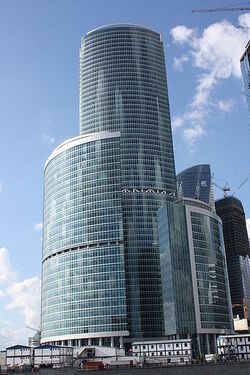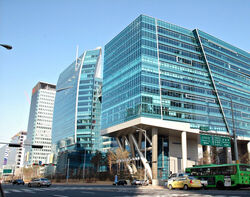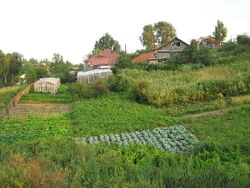Trigunia has a strong mixed economy which has many command tendencies. The economy underwent tremendous stress as it moved from a centrally planned economy to a free market system in the late 3200s. However, it appears that the nation has weathered the crisis relatively well. The current GDP has grown to more than ℜ339.8 billion in recent years and is expected to grow slowly as the dramatic hills and valleys of the market economy are foregoed by government intervention in the market.
Overview[]
- Trigunia has once one of the most open economies in the world, there is very little regulation in most major sectors of the economy; this has changed recently due to several economic crises and the re-emergence of socialist and communist influences in government
- Trigunia once boasted to the world that it has the most investment friendly nation with an unregulated stock market; however, since the early 3100s traditionally the market has been allowed to exist and it has been strictly regulated, if not owned outright, by the government
- Since the early 3270s, there has been minimal income tax on corporations (5%) as well as an almost entirely luxury goods sales tax-based government
- government, despite its relatively small budget, invests enormous amounts of capital into pet sectors of the economy; these sectors are chosen and recommended to the government by the National Chamber of Commerce; as of recently, these sectors include information technology, communications, research & design, international finance, and internal transportation
- transportation systems, the lifeblood of internal and external commerce, is a huge priority for the government; given Trigunia's severe weather, much maintenance is needed on roads, rails, bridges, and others; therefore, transportation funding makes up a large part of both the national and Oblast budgets
Five-Year Plans[]
- despite its enormous economic freedoms and lack of regulation, the government still maintains a strong force in the economy through a series of Five-Year Plans which are discussed with and then carried out through the National Chamber of Commerce with the government's support; however, unlike in planned and heavily regulated economies, these Five-Year Plans do not dictate production and consumption but instead are a series of investment and return targets
Economic Sectors[]
Information Technology[]
The IT market is the fastest growing and most dynamic sector of the Trigunian economy. Thanks to massive government investment and subsidies the information technology industry is rapidly becoming the largest segment and most important sector. From the start of the Mashkov Reforms in early 2902, the number of IT businesses started has grown twelve-fold and by 2010 the number of people employed in the industry has skyrocketed to nearly 25 million.

The A.A. Savin IT complex.
Since the year 2902, the start of the Mashkov Reforms, the IT industry has demonstrated growth rates of 30-40 percent a year, growing by 49% in 2905 alone! The biggest sector in terms of revenue has been system and network integration, which has accounted for 33% of the total market revenues. Meanwhile the fastest growing segment of the IT industry is offshore programming in which exports have risen from just ℜ500 million in 2900 to ℜ14 billion in 2910. Market analysts predict this indicator to increase a further tenfold by 2920.
Research & Development[]
Given that new product design and development is a crucial factor in the survival the growth of all economies, Trigunia has invested heavily in R&D in order to rapidly grow its economy. However, given that research and development are very difficult to manage since the defining feature of research is that the researchers do not know in advance exactly how to accomplish the desired result, many opponents have criticized the Mashkov Reforms in this area. Yuri Vasnetsov, chief editor of Raza Gazeta (The Times Gazette) magazine has criticized government by saying "higher R&D spending does not guarantee a more creativity, higher profit or a greater market share for the people or companies of Trigunia and for the Viceroy's Government to believe this is the equivalent of gambling the nation's wealth". However, thus far, the Government has been proven right as the GDP has risen by several millions in the last several years.
Finance[]
Per legislation by the Government of Trigunia, the Central Bank of Trigunia is an independently-run organ of the government while all smaller or local community banks are privately owned and run. Several provinces own and operate their own central banks
Manufacturing[]
After years of Communist and totalitarian government dominance, poor management and very low investment, much of Trigunia's industries are antiquated and highly inefficient. While it was able to maintain adequate levels of employment for Trigunians, it was experiencing great difficulties as the population rose astronomically in the 29th century.
Alongside these difficulties, consumers suffered from an overemphasis on heavy industry and shoddy consumer products. Products, at one point, became so poorly produced and distributed that large numbers of consumers boycotted Trigunian-made products, refusing to purchase all but the most essential items. The frightened Communist government quickly changed gears and allowed private enterprises to obtain charters to open and maintain competitive factories in some sectors. However, the number of charters was intentionally left low so these changes affected only a few industries in a few areas of the nation.
By 2900, industry still represented a poor state and because of this, several years later under the Mashkov Reforms, many large and bloated industries were eliminated leading to massive unemployment and strikes. However, under the Reforms, the Government poured huge sums of money into educating a new workforce to replace the manufacturing-production industry with a knowledge-production industry.

The time- and energy-efficient factory buildings of OSPC heavy automobile firm.
Mashkov Reforms[]
The Mashkov Reforms were not kind to the manufacturing sector of the Trigunian economy. Large boards were established to determine the viability of factories or determine if anything was salvageable from them before they were forcably closed. Hundreds of large factories were gutted and boarded up between 2902 and 2904.
Despite the massive shakeup, industry bounced back in mid 2905 with new range of Trigunian-made consumer products; from textiles and accessories to electronics and automobiles. These newly formed and liberalized companies were given government subsidies and loans to construct the most time- and energy-efficient buildings and hire local contractors to build them. By 2910, manufacturing still only functioned at one-third of its 2900 level; however, due to increased efficiency, only accrued one-tenth of the costs of that year.
Economists estimate that in the next decades, the manufacturing jobs in Trigunia will not return but the amount produced will increase due to greater efficiency and technology improvements.
Energy[]
Agriculture[]

Ramshackle Trigunian farm in Chadonia. Throughout the nation, the sudden shift to a knowledge or technology-based economy has left many farming villages without young adults. This rural flight has greatly reduced the productivity of Trigunia's farms.
- Trigunia allows the local Oblast governments to decide on agricultural policies
- to combat rural flight and the inefficient nature of Trigunian agriculture, Yulrath Oblast has initiated several efforts to modernize the farms; doing so by contracting with several large agriprocessors to do most of the growing
- because of this, many small farmers and small farms have been bought up in Yulrath, but most former farmers have become employees of the contracted companies
Infrastructure & Transportation[]
- infrastructure is heavily invested in by the national and the Oblast governments; this is partially to maintain the transportation system given the severe weather throughout Trigunia for roughly nine months of the year
- heavy investment in train and rail systems, both passenger and freight
Rail[]
- rail transport is the most important and cost-effective format; more than 80% of the products produced in the interior of the nation are transported to the coastal cities and ports by rail
- during communist times, railroads were an easier investment in transportation for people rather than roads for automobiles so the government spent large sums to create an adequate rail system
- once privatized, the rail system saw large influxes of money as commuters began using the trains and raw material or manufacturing companies sprang up in the interior which needed their goods transported
Airlines[]
- airline travel is important but given little governmental support; most of Trigunia falls under regional airline jurisdiction with several private providers; however, internationally, there is only one flag carrier airline called Nebo Mezhdunarodnaya (Sky International), often simply referred to as Nebo or "Sky" which is partially owned by the national government (20%) through the work of the investment firm National Chamber of Commerce, the Airline Group which is a collective ownership investment group shared between the different regional airlines, several Oblasts and private investment companies and investors
- Sky is broken into division for each continent; these divisions are nearly self-contained with profits being shared only within the division and the Controlling Team
Shipping[]
- Being and island nation, Trigunia has the second largest merchant fleet in the world; however, if the internal ferry and Keris ferry systems are included, Trigunia has by far the largest merchant fleet
- Because of positive business atmosphere, Trigunia is home to more than 30 major merchant shipping companies which transport billions of rabols worth of goods to and from Trigunia every day, however, these ships do not work exclusively with Trigunia but instead ship products and goods through and between various ports throughout Terra
- Trigunia has an internal ferry system which transports people and goods between the islands of Tirgith & Lesser Chadonya and the Greater Chadonya, but also between Great Bear Island and the Greater Chadonya, although Great Bear Island is home to the Great Northern Fleet and has few civilians
- Along side the internal ferry system is the Kerissian ferry system which transports people and goods between the separate island nations of Keris; these ferries are operated in conjunction with countries of Keris who each own a portion of the umbrella Severnyĭ paromy (Northern Ferries) which operate in the Green Sea and the Sea of Deliverance between the separate nations
- Greater cooperation has taken place between the mainland & the smaller isles
Road Travel[]
- road travel is relatively new in Trigunia as communist governmental & economic restrictions made the availablity of automobiles too costly for ordinary people
- that changed with the ending of strict communist rule and the nation was quickly flooded with foreign auto exports until Trigunian-made autos returned; the influx of cars caused major problems for the crumbling road system of most major cities
- local governments enacted policies to create new & better road systems; many of which were linked together on the money of the major cities themselves, especially the coast cities which are typically on a few dozen to few hundred miles away
- Today, the road system is much better maintained, however, in the winter months (esepcially in the Interior) the roads can be difficult to keep clear of ice & snow
- the road systems in several Oblasts are often not in the best of shape given the enormous costs of maintainence after the brutal winters of much of the islands
- because of damage caused by the use of sand and salt mixes, Trigunians oblasts have invested in many alternatives which will do teh same job while damaging the roadways less
International Trade[]
Trigunia maintains trade relations with almost all countries.
Major import items: food, uranium, coal, cobalt
The main items of export: weapons, vehicles, electronics, machine tools
Currency & Central Bank[]
- Trigunian Rabol (TRA) is the currency (ℜ), continuously has maintained is power as a worldwide currency; its value is very high and because of this, the pay of Trigunians is lower in real money than other countries, however, the rabol has very high purchasing power parity
- several countries, including Hulstria and Dolgaria, have begun to invest in Trigunian currency, some have begun to collect it for strategic foreign currency reserves; this has caused some friction with the Trigunian government given that it would prefer that its limited supply of money be kept as more liquid assets, Finance Minister A. P. Arshavin, Ph.D., MRP voiced concern that such foreign hoarding may lead to deflation of the currency
- central bank has successfully regulated the currency through rapid economic changes and growth; there has been little inflation, however, there have been calls from economists that the central bank is too concerned with inflation and has been too miserly in its regulation and needs to release more currency to fulfill the needs of the nation, as well as foreign investors holding the currency.
- central bank is a government-owned and bank, run by the Finance Ministry; chairman of the bank has often been chosen to be the finance minister, and because of this, there is a strong relationship between the Young Guard Party and the financial sector
- the central is solely concerned with the amount of currency in circulation as well as regulating interest rates, which it has maintained at medium to strict levels to counter inflation but also not to stem economic growth
- found itself working alongside the National Chamber of Commerce, which has differing views toward inflation and wishes to lower interest rates; small tug-of-war between the two organizations

